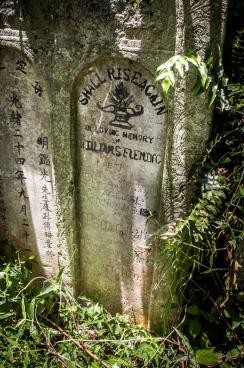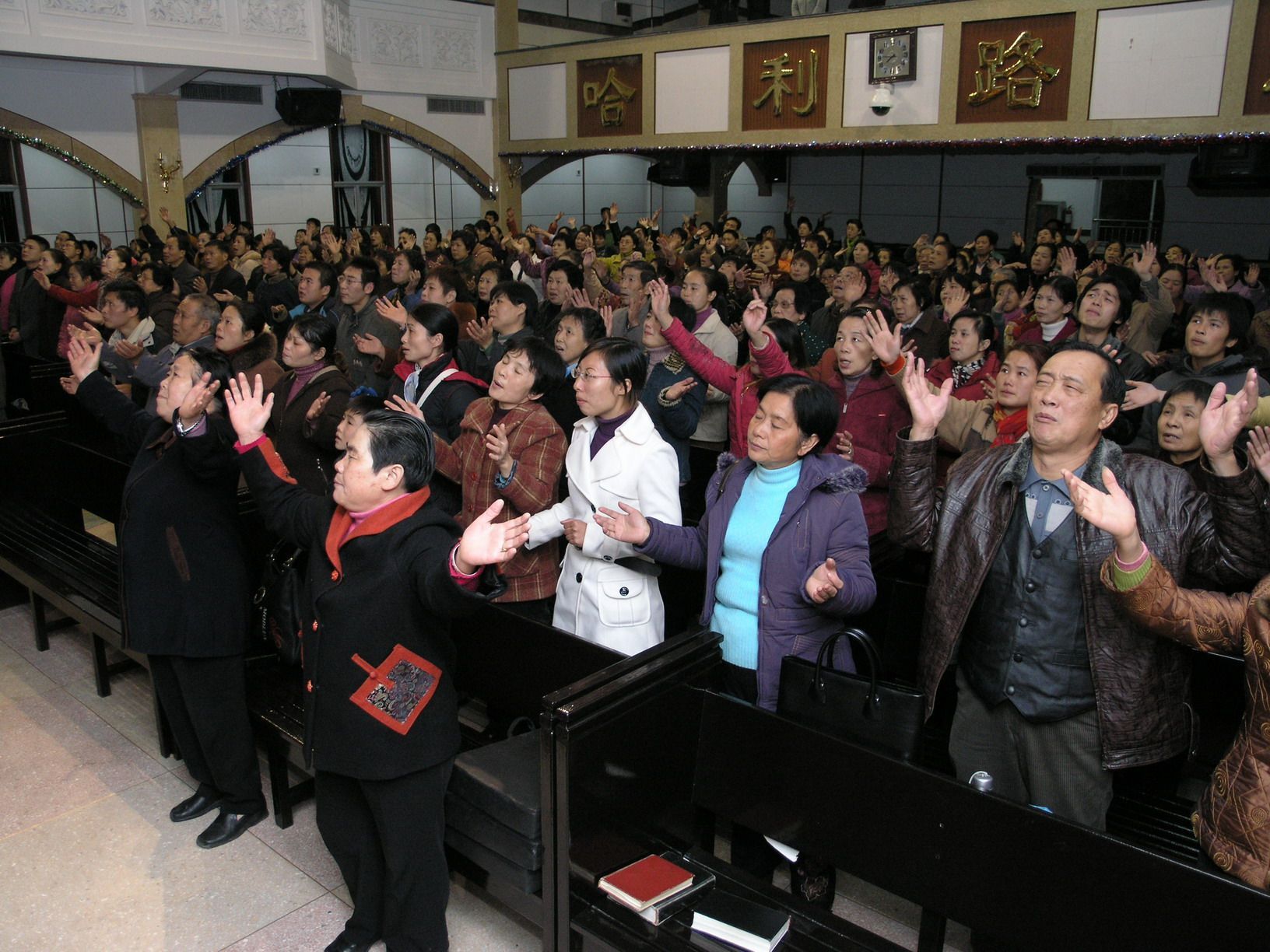1890s
The Kingdom Steadily Expands

A group of Christian men at Wenzhou in 1893.
God's kingdom grew steadily throughout Zhejiang in the 1890s, although the work in Wenzhou suffered a blow when pioneer Scottish missionary George Stott suddenly passed away in 1889, at the age of 54. His wife Grace, after a period of mourning, concluded that God was not finished with her call, and she continued to serve in the city for many years. In May 1890, the leader of the CIM work in Wenzhou noted:
"This has been the most successful year, so far as baptisms and general work is concerned, since the opening of the station over 20 years ago.... This year, up till now there have been 57 persons received into the Church by baptism, and still there's more to follow! .... One man from Dongling, formerly a professional boxer, told of the wonderful way in which he was led to the Lord. At first he was bitterly opposed to the doctrine, but like Paul of old, he was arrested in his course, and now goes about the whole countryside in his lawful occupation of cattle-dealer, and at the same time most earnestly preaches Christ to all who care to listen."[1]
Revival in Taizhou
Although the city and area around Wenzhou had experienced strong growth through the ministry of the Stotts and others, in the 1890s the Taizhou region further north emerged as the powerhouse of Christianity in Zhejiang Province.
Evangelical work had commenced in Taizhou in 1867, when a man heard that Jesus could set people free from opium addiction. He made his way to the mission hospital at Ningbo and underwent successful treatment to liberate him from the drug.
While in the hospital he heard the gospel for the first time. He "wrote at once to beg his father to come up and see and hear for himself. The old man came up, and after some time father and son were baptized together.... Though the son was subjected to violent persecution, he stood firm, and the gospel seed struck root."[2]
In the 1890s the wind of the Holy Spirit blew strongly upon the believers in Taizhou, and their zeal to win the lost resulted in hundreds of conversions every year. Grace Stott recalled one special meeting where the zeal of the Taizhou Christians rubbed off on the Wenzhou believers, causing them to trust God for more salvations:
"There had been quite a revival in several of the Taizhou out-stations....and we longed that we should see like blessing. I asked Mr. Liu if he would give us on Sunday afternoon a little account of the work there; so, instead of separating into our several classes, we all came together to hear what God had been doing in other places. Our hearts warmed as we heard of 147 baptisms in 1892.
In the course of his remarks, Liu said that Wenzhou was considered the first station, both in numbers and spiritual power, while Taizhou was second. When he finished I felt constrained to add a few words. I remarked that Wenzhou had stood first, but could do so no longer. I contrasted our poor 30 baptisms with their 147, and asked who would join me in a week's daily prayer for deeper spiritual power in our own souls, and new life for others. Up went many hands. I asked what we should pray for, and one brother called out, 'Seven hundred souls!'
I was taken aback; my poor faith had not risen above 100. I said, 'Let us think well before we speak. God is able to give us all we have faith for.' Then one dear man called out, 'Up with your hands for 300 next year.' I pointed out that if each member would win one soul to Christ our numbers would just be doubled, and that seemed very little. So it was settled that as many as possible should meet for prayer every day during the first week of the Chinese year, and that after prayer we should make up several bands, and go in different directions, preaching the glorious gospel, and we expected much blessing."[3]
As the numbers in the table indicate, the CIM's work in Zhejiang flourished under the hand of God's blessing in the 1890s, with annual reports showing a steady cumulative increase in church members.
China Inland Mission — Zhejiang in the 1890s
| Year | Baptisms | Church Members |
|---|---|---|
| 1890[4] | 154 | 1,097 |
| 1891[5] | 97 | 1,121 |
| 1892[6] | 194 | 1,217 |
| 1893[7] | 236 | 1,518 |
| 1894[8] | 473 | 2,100 |
| 1895[9] | 282 | 1,981 |
| 1897[10] | 801 | 2,980 |
| 1898[11] | 348 | 3,710 |
Problems Abound
In addition to the external pressures on the Church, many internal problems broke out, as often occurs when quick church growth is experienced. In one short period, five key members of the church in Wenzhou died. These events shook the faith of many new believers, causing Grace Stott to lament that "one family was plunged into sore and continuous persecution. Worst of all, one man fell into open sin, while the pastor forgot his holy calling and gave way to wrath. The pastor's case was particularly sad."[12]
These problems proved to be no more than temporary setbacks in Wenzhou, however, and steady growth soon resumed, with Stott writing in late 1893: "Our large chapel, which seats 350, has several times been crowded with Christians and inquirers to its utmost capacity, and we are brought face to face with the question of enlarging our borders; either the chapel must be made bigger, or a new one opened outside the South Gate."[13]
As the size and influence of the Church continued to expand throughout Zhejiang, many incidents of persecution broke out against Chinese believers. In 1895 a riot occurred near Pingyang, when local villagers found that the eyes of some of their idols had been scratched out. A feast was held at a temple, where a spirit-priest went into a trance and asked the spirits to reveal who had committed the act.
While under the control of a spirit, the man declared that the deed had been done by followers of the "foreign doctrine" (that is, Christianity). In that village there were no Christians at the time, but members of one particular family were known to have inquired into the teaching. They were severely beaten and their goods seized, though they strongly protested their innocence. Notices were circulated throughout the district calling for the extermination of all followers of Jesus.
A few days later an unsuspecting evangelist, Wu Dongfu, passed through the area. A mob accused him of stealing the eyes of the idols. Before Wu had a chance to reply the enraged villagers beat him, tore his clothes, and were preparing to kill him when a police officer arrived and restored order. Throughout the region at least 18 Christian families had their homes demolished and their possessions looted, leaving them destitute. The attacks continued for some time, causing many believers to flee for their lives.
Undeterred by the violence, a church leader wrote, "Amid all that has happened, how thankful we are to God that no lives have been lost. We are sure that God has a great purpose in permitting all this trouble to fall upon us. We know that it shall yet all work for lasting blessing to all the Christians involved, as well as being the means of bringing blessing upon our persecutors."[14]
From Buddha to the Living God
Accounts of remarkable Christian conversions continued to roll in from throughout Zhejiang during the 1890s, as the Holy Spirit moved on people's hearts and transformed their lives from darkness to light. One man named Yu Yushan had been an officer in the imperial army during the Taiping Rebellion in the 1850s and 1860s. After the war he joined a strict sect of Buddhism, and traveled around the countryside spreading that doctrine to many people while carrying out his profession as a medical doctor.
Some years later Yu stumbled into a chapel in the city of Jinhua. For one year he attended almost every service, and gradually the light of God's truth dawned in his heart. He surrendered his life to Jesus Christ and was baptized in 1876.
A few months after his conversion, Yu fell ill and was confined to bed. During that time he took stock of his life, and God called him to serve in the neighboring province of Jiangxi, where he had spent much time formerly spreading Buddhist teachings. After summoning missionary A. W. Douthwaite to his bedside, Yu said: "I have led hundreds on the wrong road, and now I want to lead them to the way of truth. Let me go. I ask no wages, nor do I want any of your money. I only want to serve Jesus."[15]
Yu Yushan went out as promised, sharing the salvation of Jesus Christ with as many people as would listen. A year later the missionaries followed in his trail. They baptized 15 of Yu's converts in Taiyang village, and formed a church at another town, which grew to more than 70 members.
Yu Yushan passed into the presence of his Lord and Savior a few years later, but the former Buddhist left behind much good fruit for the kingdom of God.
© This article is an extract from Paul Hattaway's book 'Zhejiang: The Jerusalem of China'. You can order this or any of The China Chronicles books and e-books from our online bookstore .
1. Mr. Grierson, "God's Work at Wun-chau," China's Millions (May 1890), p. 63.
2. D. MacGillivray (ed.), A Century of Protestant Missions in China (1807-1907) (Shanghai: American Presbyterian Mission Press, 1907), p. 26.
3. Stott, Twenty-Six Years of Missionary Work in China, pp. 289-90.
4. China's Millions (August 1890), p. 102.
5. China's Millions (August-September 1891), p. 120.
6. China's Millions (July 1892), p. 98.
7. China's Millions (October 1893), p. 135.
8. China's Millions (September 1894), p. 115.
9. China's Millions (September 1895), pp. 123-4.
10. China's Millions (August 1897), p. 112. The sudden increase of believers in Zhejiang this year was due almost entirely to the churches in Taizhou, which baptized 630 new believers and reported a total of 1,535 members.
11. China's Millions (November 1899), p. 168.
12. Stott, Twenty-Six Years of Missionary Work in China, p. 291.
13. Stott, Twenty-Six Years of Missionary Work in China, p. 294.
14. "Persecution of Native Christians," China's Millions (October 1895), p. 148.
15. A. W. Douthwaite, "Fruit After Many Days—the Story of Yu Yuh-shan," China's Millions (January 1891), p. 4.





